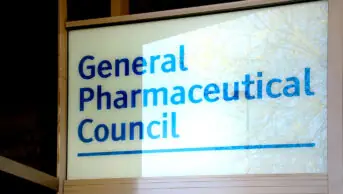
General Pharmaceutical Council
Pharmacists have given a mixed response to proposed new guidance from the professional regulator around the training of unregistered pharmacy staff.
Proposals by the General Pharmaceutical Council (GPhC) to transfer the responsibility for staff training from the pharmacist to the pharmacy owner were seen as “logical”, but there was concern that standards could slip if the owner was not a qualified pharmacist, according to responses to the proposed new guidance that has been out for consultation.
The profession was also split over plans to introduce national level 2 qualifications for unregistered pharmacy employees — replacing the present system that relies on qualifications approved by the GPhC.
There were fears that the quality of training might suffer if the GPhC had no influence over the content and standards of the national qualifications.
The proposed system of NVQs/SVQs could also be more burdensome and expensive than the current qualifications and could require more input from qualified pharmacists at a time when services were already under strain, according to the results of the consultation.
The proposed guidance is targeted at registered pharmacy owners and designed to help them meet the new professional standards required for registered pharmacies.
The proposals were out for consultation between July and October 2017. Responses were considered by the GPhC at its meeting on 8 March 2018, with final guidance due to be published by the summer.
Duncan Rudkin, GPhC chief executive and registrar, told the The Pharmaceutical Journal that the results of the consultation showed that there was still a “lot of work to be done to understand the issues and resolve them”. He said: “A lot of issues have been identified in a way that has taken the scope [of the consultation] a lot wider than we had originally hoped, so it has taken us longer.”
He added: “For me, it’s important to put this debate in the context of a really important principle that underpins what we are trying to do here. People should be accountable for the things they control. The point here is that it is down to the owners of pharmacies to be in control of staff training ….and that is right. This is not about disempowering anybody but just to be clear about who is responsible for what.”
But he agreed that the GPhC should be clearer about the valuable contribution of pharmacists towards identifying the skills gaps of unregistered staff and the training they needed. “We have more work to do here,” he said.
The GPhC was also prepared to look in more detail at the proposal to bring in national qualifications which do not require any input from the professional regulator. He accepted that there might be a future role for the Royal Pharmaceutical Society in providing the qualification quality assurance that some in the profession felt was needed.
Requests from some pharmacists for the regulator to create a safe staffing formula for pharmacies as part of the guidance had not been completely ruled out. Rudkin said: “We need to keep this [issue] under review.”
But he reiterated the current position that it was impossible to design a single safe staffing formula because all pharmacies were different and introducing one would “relieve” pharmacy owners of their responsibilities to their staff. “But it’s a topic that we will continue to discuss in public in the council,” he said.


